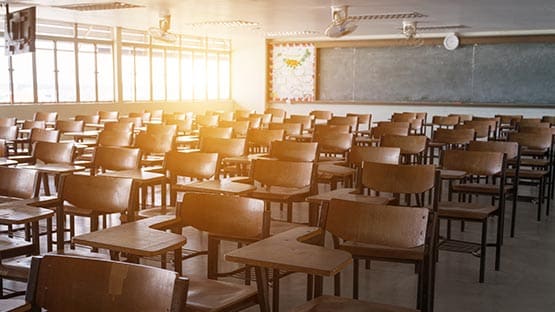
The Virginia Board of Education today approved the establishment of six additional Lab Schools across the Commonwealth, from Southwest Virginia to Hampton Roads and Northern Virginia.
The higher education partners include Emory & Henry College, George Mason University, Roanoke College, Old Dominion University – Newport News, Old Dominion University – Chesapeake and Paul D. Camp Community College.
“With the addition of these six Lab Schools, the Board has created enriching, future-focused opportunities that reach students across Virginia,” Gov. Glenn Youngkin said. “These schools are establishing innovative pathways for students to explore potential careers and be better prepared for the future, with a specific focus on addressing the needs and demands of their regions. These Lab Schools are not just shaping the future of our students, they’re also shaping the future of Virginia.”
Virginia Secretary of Education Aimee Guidera expressed pride in the Commonwealth’s “higher education institutions, school divisions, and community partners who have brought forth programs that prepare Virginia students for both post-secondary education and meaningful career options.”
“On behalf of the Board, I am excited to approve these six Lab Schools today and help create innovative educational programs that serve students, educators, and the communities in which they are based. It’s been inspiring to see the progression of these schools, and we are looking forward to seeing the impact they make in the years to come,” said President of the Virginia Board of Education Grace Turner Creasey.
Virginia Superintendent of Public Instruction Lisa Coons said the six school divisions approved today are a direct result of the mindset of the representatives “who transformed their vision and, with the support of their communities, made these Lab Schools a reality. I am grateful for every person who worked to create the foundation for these powerful programs, as well as the people who worked behind the scenes to make these Lab Schools a reality for Virginia students. These Lab Schools are poised to help students across the Commonwealth meet the industry demands and standards for the in-demand careers of the future.”
Virginia Lab Schools are designed to stimulate the development of innovative education programs for Virginia students from preschool through 12th grade. In partnership with local employers and community organizations, their academic programs focus on expanding opportunities for students with exposure to workplaces designed to highlight the important role success in academics plays in life. Lab schools offer unique and focused opportunities to help students understand with greater clarity the career pathways for life after high school graduation.
Under the budget in place until June 30, 2024, the Commonwealth has a statutory requirement and dedicated funding to move forward with Lab School development. The Board’s approvals today continue to fulfill the requirements in partnership with Virginia’s community colleges, universities, private and public schools and local communities to give students across the Commonwealth innovative opportunities to build for future success.
Below is an overview of the six Lab Schools that were approved today:
Emory & Henry College’s proposed Lab School, the Southwest Virginia Healthcare Excellence Academy Lab School (SWVA-HEALS), is a collaborative partnership between Emory & Henry College (EMC); the school divisions of Smyth County, Wythe County, Washington County, and the City of Bristol; Virginia Highlands Community College; Wytheville Community College; the A. Linwood Holton Governor’s School; and the Southwest Virginia Higher Education Center.
The SWVA-HEALS program establishes a high school career academy for students in Grades 10-12 to serve as a pipeline for preparing future healthcare professionals to meet the workforce shortages in Southwest Virginia. The mission of SWVA-HEALS is to work collaboratively with regional education, healthcare, and community partners to provide a rigorous, high-quality learning environment that promotes increased awareness of potential healthcare careers and prepares college and career ready students to pursue the required college degrees and professional credentials that lead to healthcare careers and increase the number of future healthcare providers practicing in Southwest Virginia.
“Emory & Henry and our collaborative partners are thrilled to move forward in implementing the HEALS program. This unique career academy program will provide high school students with the strong science and healthcare-related curriculum pathways and work-based learning experiences needed to successfully pursue a career in healthcare. We truly believe the HEALS program will provide an outstanding college and career preparation for students while also helping to reduce the healthcare workforce shortages in Southwest Virginia,” said Dr. A. Louise Fincher, Senior Vice President and Dean of Emory & Henry College’s School of Health Sciences.
George Mason University’s proposed Lab School, Accelerated College and Employability Skills (ACCESS) Academy Lab School, is a collaborative partnership between George Mason University (GMU), Northern Virginia Community College (NOVA), and Fairfax County Public Schools (FCPS).
The mission of ACCESS Academy is to provide new innovative pathways for traditionally underserved students toward high demand, well compensated careers, while simultaneously working toward two- and four-year degrees to maximize their earning potential. ACCESS Academy is designed to support the transition of at-risk learners into college and high-demand careers, with a preliminary focus on Information Technology. In addition, ACCESS Academy will incorporate employability skills, innovative teaching and learning methods, and experiences co-designed with industry partners, researchers, and instructional faculty.
“ACCESS Academy is a bold step toward creating pathways for traditionally underserved students into high-demand, well-compensated careers, all while earning two- and four-year degrees. Our focus on innovative, problem-based learning, 21st Century skills, and robust wraparound support ensures that ACCESS Academy students are well-equipped to meet the evolving demands of the workforce. Our vision is to prepare adaptable, lifelong learners who can collaboratively and creatively solve complex problems, no matter how technology and work environments change. This is about more than education; it’s about empowering students to build a better future for themselves and their communities,” said Dr. Ingrid Guerra-López, Dean of George Mason University’s College of Education and Human Development.
Roanoke College’s proposed Lab School, Explore@RC, is a partnership between Roanoke College and Salem City Schools. Explore@RC’s mission is to cultivate a diverse and inclusive learning community where all students can reach their full potential, regardless of their background or circumstances. The program features three career-oriented pathways: education/global studies, STEM/healthcare, and communications/civic engagement. The program will culminate in a senior capstone course with project-based learning and fieldwork related to the selected career pathway. These pathways tie directly into workforce needs in the Roanoke region and will set students up for success in their chosen pathway through academic preparation and real-world learning opportunities. Explore@RC students will have the unique opportunity to experience the critical exposure of class attendance on Roanoke College’s campus.
“Explore@RC is an exciting opportunity for Roanoke College to work closely with our community partners and a new group of students,” said Dr. Lisa Stoneman, chair of Roanoke College’s Education Department. “Our team has been planning collaboratively with Salem City Schools for more than a year to prepare for the arrival of our first cohort, and now that we have official approval, we’re ready to hit the ground running.”
Paul D. Camp Community College’s proposed Lab School, the Isle of Maritime Trades Academy (IMTA), is a result of a partnership between Paul D. Camp Community College and the Isle of Wright County Public Schools. IMTA is designed to provide a high school-to-college-to-work pipeline in a partnership between Paul D. Camp Community College, Isle of Wight County Public Schools, and initial primary corporate partner, Huntington Ingalls Industries-Newport News Shipbuilding (NNS).
IMTA will educate and train a significant and sustainable number of students in maritime trades annually, through innovative, integrated, experience- and project-based career technical education, so that academy graduates are workplace ready upon high school graduation. The program will have a significant impact on students, families, community, and the maritime industrial workforce by preparing students for immediate employment in high-demand skilled trades with regional maritime employers, in career pathways that provide a family-sustaining income and opportunities for additional career advancement through further education or training after high school. The overall goal of the IMTA Lab School is to graduate students who possess in-demand technical and workplace-ready skills for middle skill jobs with NNS and similar employers, and to position students in career pathways that provide options for advancement with additional education or training.
“The Isle Maritime Trades Academy (IMTA) is not just an avenue to a career pathway for Lab School students from Isle of Wight and the surrounding school districts, it will also allow them to be a part of something bigger than themselves- national security. Lab School students will ultimately have the opportunity to help build Navy Ships that will ensure the nation’s defense and security. In addition, the IMTA will help our partners at Newport News Shipyard fill the projected 20,000 employees needed over the next five years,” said Dr. Corey L. McCray, President at Paul D. Camp Community College.
Old Dominion University – Newport News’ proposed Lab School, Maritime Engineering and Environmental Studies Academy (MEESA), was developed by Old Dominion University – Newport News in collaboration with Newport News Public Schools. MEESA focuses heavily on student guided learning through STEM, Experiential Learning, Guided Inquiry, Design Thinking, Career and Technical Education, as well as internships and job shadowing opportunities. MEESA will align with education, research, and innovation efforts at Old Dominion University around maritime engineering, as well as with the Virginia Digital Maritime Center, an initiative designed to enhance the region’s maritime workforce. MEESA’s overall vision is to be a beacon of excellence; cultivate stewards of the seas and guardians of the environment; and prepare students for a world of digital engineering, as it pioneers transformative education, research, and hands-on exploration for a brighter, more resilient maritime future.
“Maritime industries are one of the key economic drivers in our region. In order to best prepare the future maritime workforce and enhance economic and workforce development in Hampton Roads, it is critical that high school students are introduced to the subject matter. Just as critical is the use of evidence-based strategies to teach those students. Working with the Newport News Public Schools district, the Maritime Engineering and Environmental Studies Academy will build on the collaborative strengths in our region and address both student and teacher development,” said Dr. Karen Sanzo, Director of the Institute for Design Thinking and Leadership Development at Old Dominion University.
Old Dominion University – Chesapeake’s Lab School, Computer Science Lab School (CSLS), was developed by Old Dominion University – Chesapeake in collaboration with Chesapeake Public Schools’ Oscar Smith Middle School. CSLS’s mission is to empower underrepresented middle school students through transformative opportunities and experiences in combination with an innovative focus on computer science principles. CSLS is designed to prepare students for the technology talent pipeline, have a regional focus that aligns with workforce needs, and increase the number of K-12 teachers prepared to teach Computer Science in support of students.
“ODU is committed to building the next generation of computing professionals. We are excited to work with Chesapeake Public Schools and the amazing professionals at Oscar Smith Middle to create the Computer Science Lab School. Collectively we will identify, design, and implement the most effective teaching strategies to ensure that middle school students receive the foundation they need to embark on future computing pipelines,” Sanzo said.










